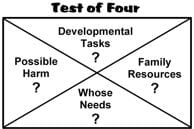By: Lisa Krause, M.A.
“My partner is deployed, and it is so hard on the kids. I want to make their life easier. I just want them to be carefree kids, so I don’t expect them to help around the house.”
“When my child’s other parent is deployed, I don’t want them to feel sad or lonely, so I keep them involved in a lot of activities. I barely have time for myself.”
These are statements that good-hearted military parents have shared about their attempt to protect their children from the downsides of military life such as multiple moves, parental deployment, or even a parent struggling with PTSD. It is easy to slip to buy too much, do too much, or fail to set boundaries or expect children to do chores. In other words, we might unintentionally invite overindulgence.
Parents want the best for their children. They want them to be safe, happy, and successful. They want to protect their children from difficult situations. This is parenting with a good heart. However, to grow confident, capable, resilient adults, children need both good and strong heart parenting. Children need to be allowed to make mistakes, struggle through problems, and feel sad. A loving caring adult’s job is to support the child as they learn new developmental tasks or experience difficult situations. Children need help not rescuing.
When adults only parent from a good heart, parents may accidentally give some risky gifts. They’re risky because parents give them without intending to. According to Clarke, Bredehoft, and Dawson, in How Much is Too Much? Raising Likeable, Responsible, Resilient Children in the Age of Overindulgence, parents can slide into overindulgence in three different ways, which all have unintended outcomes.
● Too Much- Anything that costs money, food, toys, clothes, activities, screen time, entertainment, etc. It can lead to not knowing what is enough, or confusing wants and needs.
● Over Nurture- Doing things for children that they should be doing for themselves. While it may look like protecting and helping our kids, it could create learned helplessness,
● Soft Structure- Lax rules and no chores can lead to poor self-control. Children may develop the belief that they are the center of the universe, and they may lack skills they need to be confident, capable adults.
How can we identify if parents have slipped from helping and into overindulgence?
The Test of Four is a thoughtful process that guides adults and children in decision making by asking a few simple questions:
1. Does the situation hinder the child from learning the tasks that support his or her development and learning at this age? If yes, which tasks?
2. Does the situation give a disproportionate amount of family resources to one or more of the children? (Recourses can include money, space, time, energy, attention, and psychic input.) 
3. Does this situation exist to meet the adult’s needs more than the child’s? It is important for adults to get their needs met, but overindulging children in an attempt to meet adults’ needs is not good for the children.
4. Does the child’s behavior potentially harm others, society, or the planet in some way?
A “yes” to any of the questions is an indication that overindulgence might be occurring.
Let’s think about the child that is “allowed to be a kid” and is not expected to do chores.
1. Does exempting children from chores hinder development? YES.
a. Good-hearted parents recognize that it is important to make sure children are not expected to take on adult roles, and worries, such as being the “man of the house,” or “playing the mother and caretaker.” Good and Strong heart parents learn that doing simple chores as young as three is an important part of development. Good and Strong heart parents recognize that children also need a sense of control and to feel useful when faced with difficult situations such as a parent being deployed. This helps empower the child. By expecting children to help with developmentally appropriate tasks around the house, parents are giving the helpful gifts of self- confidence, teaching life skills, and strong problem-solving skills.
2. Does it take too much of the family resources? Including time, money, and energy? STRONG POSSIBILITY.
a. If a caregiver is the only one taking care of the household responsibilities and finds they are sacrificing their well-being, or they are feeling resentful, it is a good indication that the answer to this one is yes. Teaching about chores can be a great chance to teach about the joy in caring for others.
3. Who’s needs are being met? Is it more for the adult’s need? PROBABLY.
a. If we are exempting children from household responsibilities because we feel bad, or we want to protect them, it is a good indication that it might be more for the parent’s needs than the children.
4. Does it cause harm to others or the environment? MAYBE.
a. If not helping around the house is resulting in careless behavior such as littering in public, and not taking care of property the answer to this one could be yes.
We have one strong yes and three strong probablys. This is a good indication that the adults in this family might need to wrap those good hearts with strengths by identifying the chores children should be learning.
Parenting in a military family invites many excuses to overindulge. There are many opportunities to celebration that can lead to too much, such as over the top birthdays, getting through the day, a parent coming home, etc. Protecting and sheltering children can easily shift from helping to rescuing. It is important to stay vigilant and be intentional about the positive gifts we want to give our children.
If you would like to learn more about overindulgence, view the OneOp Family Transitions webinar, Overindulgence in Parenting: How Much is Too Much. Resources on Parenting in the Age of Overindulgence, Good and Strong Heart Parenting, or the Test of Four can also be found on the University of MN Extension Center for Family Development overindulgence website, https://extension.umn.edu/parenting/overindulgence
Reference:
Clarke, J. I., Dawson, C., & Bredehoft, D. J. (2014). How much is too much? Raising likable, responsible, respectful children –from toddlers to teens- in an age of overindulgence (pp. 301-302). New York, Da Capo Press
Online Course for Parents:
Parenting in the Age of Overindulgence: How to Prevent the “I wants”
Writers Biography
 Lisa Krause, M.A. is a Certified Family Life Educator (CFLE), Parenting Coach and adjunct professor at Concordia University where she teaches family science and parent coaching. Lisa enjoys finding creative ways to bring family life education to today’s busy parents using technology and other innovative formats. You can contact Lisa at [email protected]|www.parentcoachconnection.org
Lisa Krause, M.A. is a Certified Family Life Educator (CFLE), Parenting Coach and adjunct professor at Concordia University where she teaches family science and parent coaching. Lisa enjoys finding creative ways to bring family life education to today’s busy parents using technology and other innovative formats. You can contact Lisa at [email protected]|www.parentcoachconnection.org
Photo source: Adobe stock















